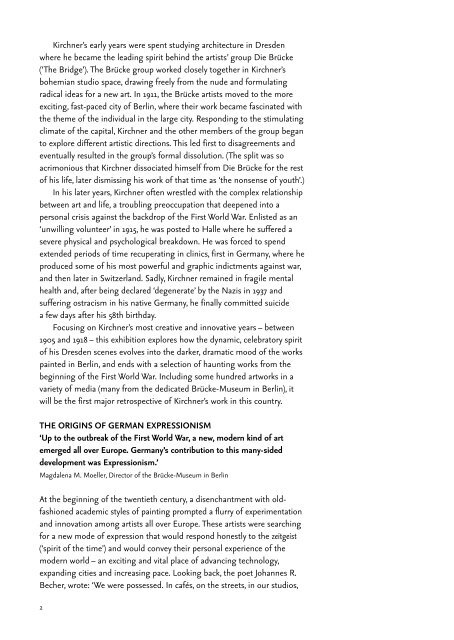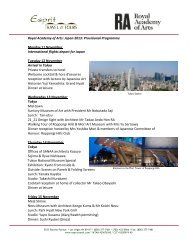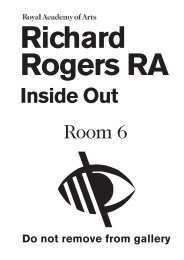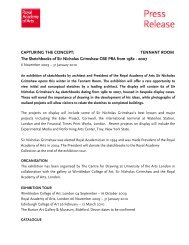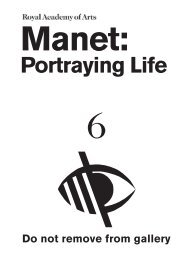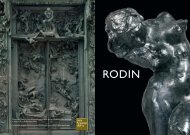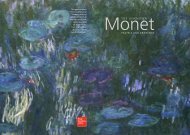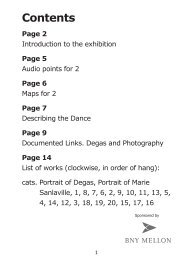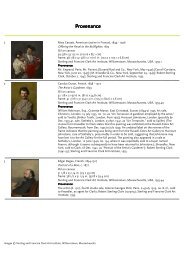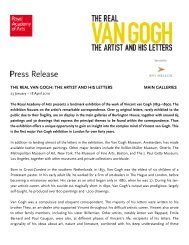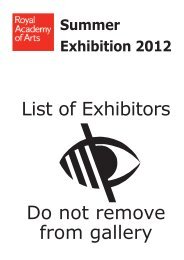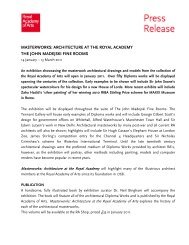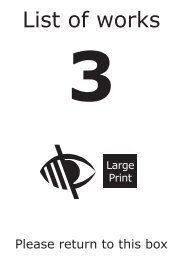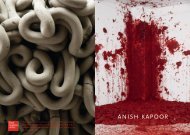KIRCHNER - Royal Academy of Arts
KIRCHNER - Royal Academy of Arts
KIRCHNER - Royal Academy of Arts
Create successful ePaper yourself
Turn your PDF publications into a flip-book with our unique Google optimized e-Paper software.
Kirchner’s early years were spent studying architecture in Dresden<br />
where he became the leading spirit behind the artists’ group Die Brücke<br />
(‘The Bridge’). The Brücke group worked closely together in Kirchner’s<br />
bohemian studio space, drawing freely from the nude and formulating<br />
radical ideas for a new art. In 1911, the Brücke artists moved to the more<br />
exciting, fast-paced city <strong>of</strong> Berlin, where their work became fascinated with<br />
the theme <strong>of</strong> the individual in the large city. Responding to the stimulating<br />
climate <strong>of</strong> the capital, Kirchner and the other members <strong>of</strong> the group began<br />
to explore different artistic directions. This led first to disagreements and<br />
eventually resulted in the group’s formal dissolution. (The split was so<br />
acrimonious that Kirchner dissociated himself from Die Brücke for the rest<br />
<strong>of</strong> his life, later dismissing his work <strong>of</strong> that time as ‘the nonsense <strong>of</strong> youth’.)<br />
In his later years, Kirchner <strong>of</strong>ten wrestled with the complex relationship<br />
between art and life, a troubling preoccupation that deepened into a<br />
personal crisis against the backdrop <strong>of</strong> the First World War. Enlisted as an<br />
‘unwilling volunteer’ in 1915, he was posted to Halle where he suffered a<br />
severe physical and psychological breakdown. He was forced to spend<br />
extended periods <strong>of</strong> time recuperating in clinics, first in Germany, where he<br />
produced some <strong>of</strong> his most powerful and graphic indictments against war,<br />
and then later in Switzerland. Sadly, Kirchner remained in fragile mental<br />
health and, after being declared ‘degenerate’ by the Nazis in 1937 and<br />
suffering ostracism in his native Germany, he finally committed suicide<br />
a few days after his 58th birthday.<br />
Focusing on Kirchner’s most creative and innovative years – between<br />
1905 and 1918 – this exhibition explores how the dynamic, celebratory spirit<br />
<strong>of</strong> his Dresden scenes evolves into the darker, dramatic mood <strong>of</strong> the works<br />
painted in Berlin, and ends with a selection <strong>of</strong> haunting works from the<br />
beginning <strong>of</strong> the First World War. Including some hundred artworks in a<br />
variety <strong>of</strong> media (many from the dedicated Brücke-Museum in Berlin), it<br />
will be the first major retrospective <strong>of</strong> Kirchner’s work in this country.<br />
THE ORIGINS OF GERMAN EXPRESSIONISM<br />
‘Up to the outbreak <strong>of</strong> the First World War, a new, modern kind <strong>of</strong> art<br />
emerged all over Europe. Germany’s contribution to this many-sided<br />
development was Expressionism.’<br />
Magdalena M. Moeller, Director <strong>of</strong> the Brücke-Museum in Berlin<br />
At the beginning <strong>of</strong> the twentieth century, a disenchantment with oldfashioned<br />
academic styles <strong>of</strong> painting prompted a flurry <strong>of</strong> experimentation<br />
and innovation among artists all over Europe. These artists were searching<br />
for a new mode <strong>of</strong> expression that would respond honestly to the zeitgeist<br />
(‘spirit <strong>of</strong> the time’) and would convey their personal experience <strong>of</strong> the<br />
modern world – an exciting and vital place <strong>of</strong> advancing technology,<br />
expanding cities and increasing pace. Looking back, the poet Johannes R.<br />
Becher, wrote: ‘We were possessed. In cafés, on the streets, in our studios,<br />
2


